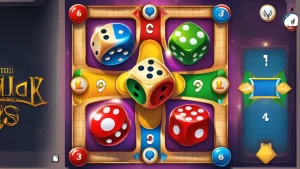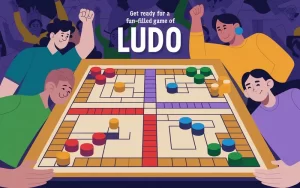Ludo, a cherished board game enjoyed by children and adults alike, is a simplified version of Pachisi, a traditional Indian game that dates back to the 6th century. Renowned for its straightforward rules and engaging gameplay, Ludo has become a staple in homes across India and beyond. This detailed article delves into the historical roots of Ludo, explores its gameplay mechanics, and highlights the educational benefits it offers to players of all ages.
Historical Roots and Evolution
Ludo’s origins can be traced to Pachisi, a game that was played in ancient India. Pachisi, often known as the “Royal Game of India,” was played on a cross-shaped board with intricate designs and was a favorite pastime among Indian royalty. The Ludo rules of the game was traditionally played with dice and pawns, and its objective was to navigate the pawns across the board and reach the home base.
Over time, Pachisi evolved into several variations, one of which is Ludo. This simplified version retained the core principles of Pachisi but made the game more accessible to younger players and those unfamiliar with the complexities of its predecessor. Ludo has since become a global phenomenon, with its colorful and engaging design appealing to players of all ages.
How to Play Ludo
The Ludo game is played on a cross-shaped board divided into four sections, each representing a different color: bright yellow, green, red, and blue. The board is designed with three adjacent columns of six squares each, forming the arms of the cross. The center of the board features a large square known as the ‘home’ area, which is divided into four triangular sections, one for each color. At each corner of the board, there are colored areas where players place their tokens at the beginning of the game.
Setting Up the Game
Each player is assigned a color and receives four tokens of that color. The tokens are placed in the starting circle corresponding to their color. The objective of the game is to move all four tokens from the starting area to the finishing square, located in the player’s home column, and ultimately reach the center of the board.
Gameplay Mechanics

Rolling the Dice: Players take turns rolling a single die. The roll determines how many squares a token can move. A roll of six is particularly significant as it allows the player to move a token out of the starting area and onto the board. Subsequent rolls of six also grant the player an extra turn.
Moving Tokens: Tokens move in a clockwise direction around the perimeter of the board. Upon reaching the player’s home column, the token moves upward to the finishing square. Players must navigate their tokens strategically to avoid being sent back to the starting point.
Capturing Tokens: If a token lands on a square occupied by an opponent’s token, the opponent’s token is sent back to its starting area. This rule adds an element of strategy to the game, as players must decide whether to advance their tokens or attempt to capture their opponent’s tokens.
Winning the Game: The game concludes when a player successfully moves all four of their tokens to the finishing square. The first player to achieve this wins the game.
Educational Benefits
Ludo online is more than just a fun pastime; it offers valuable educational benefits for players, particularly children. The game’s simple rules and reliance on dice rolls help young players develop essential skills, including:
- Numeracy: As players roll the dice and move their tokens, they practice counting and simple arithmetic.
- Strategy and Planning: Players must think strategically about their moves, balancing the risk of capturing opponents’ tokens with the goal of advancing their own tokens.
- Decision-Making: The game encourages players to make decisions based on the dice rolls and their current position on the board.
- Social Interaction: Ludo provides an opportunity for social interaction, fostering communication and cooperation among players.
Conclusion
Ludo, with its rich historical background and engaging gameplay, remains a beloved board game across generations. Its simplicity and strategic elements make it an ideal choice for family gatherings and social events. Beyond its entertainment value, Ludo serves as an educational tool, helping players of all ages develop important cognitive and social skills. Download Ludo for a timeless experience that continues to captivate and educate players around the world.







